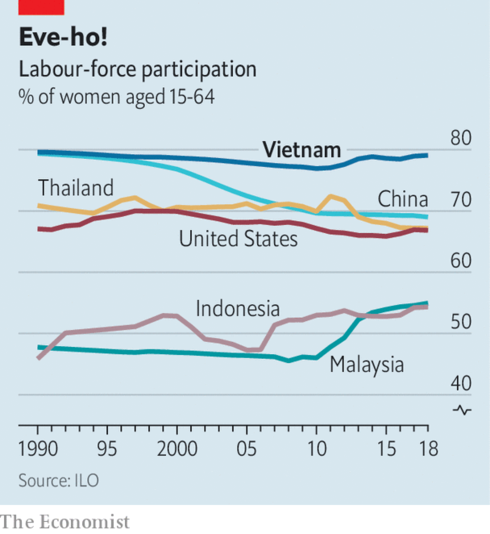 |
Vietnam has one of the highest female labor-force participation rates (the proportion of women who are in paid work or looking for it) in the world, The Economist reported.
In Vietnam, some 79% of women aged 15 to 64 are in the labor force, compared with 86% of men.
That figure is higher than in all the members of the Organization for Economic Cooperation and Development (OECD) except Iceland, Sweden and Switzerland, and ten percentage points above China, Vietnam’s northern neighbor.
The different sexes gravitate towards different types of work. Men tend to take jobs in corporations or organizations that confer status, whereas women tend to be more enterprising.
In terms of the sex of new business owners across 54 countries, Vietnam had the highest ratio of women to men: 1.14 to 1, according to the Global Entrepreneurship Monitor.
Nevertheless, businesses owned by women tend to be informal and women make up 55% of the self-employed.
But as the economy shifts from farming to manufacturing, working women are becoming more independent.
A recent report from the Mekong Development Research Institute, a think-tank, finds that new roads in the Mekong Delta over the past decade have made it easier for women to work in nearby textile and packaging factories, while their husbands stay at home and tend the family farm. Women in the region now earn more than men, and the balance of power between them and their husbands has shifted.
Along with high female labor-force participation rate, the proportion of women in senior managing positions in enterprises operating in Vietnam was ranked second in Asia at 36%, only behind the Philippines at 37.46, according to Grant Thornton in its 2019 Women in business report.
Nguyen Thi Vinh Ha, Grant Thornton’s head of Advisory Services, said Vietnam’s second ranking in Asia is hardly a surprise, given the important role of Vietnamese women in the economy.
In a broader perspective, Vietnam currently has a series of female leaders holding positions of major influence in the society, Ha added.
However, the report also pointed to some challenges to female leaders in Vietnam, including the lack of opportunity for job progression, opportunity to establish working relation, and family responsibility. Hanoitimes
 In terms of the gender of new business owners across 54 countries, Vietnam had the highest ratio of women to men: 1.14 to 1, according to the Global Entrepreneurship Monitor.
In terms of the gender of new business owners across 54 countries, Vietnam had the highest ratio of women to men: 1.14 to 1, according to the Global Entrepreneurship Monitor.